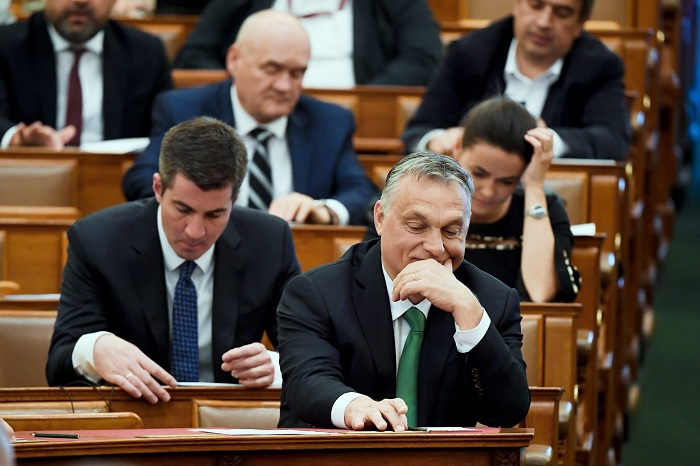
Even as the coronavirus pandemic rages, Hungary’s government has its eye on the 2022 election with a series of laws designed to improve its chances of winning.
Only a few hours after the Hungarian parliament voted near-unanimously on Tuesday to give Prime Minister Viktor Orban extraordinary powers to rule by decree for 90 days to combat the worsening coronavirus pandemic, the government surprised the opposition with a list of controversial draft bills.
None of these had anything to do with the current health or economic challenges but rather were concerned more with trying to improve the ruling Fidesz party’s chances in the next parliamentary elections, scheduled for 2022 at the latest.
As Fidesz has an unassailable two-thirds majority in parliament, all the legislation is expected to pass.
The most controversial of the bills was submitted just one minute before midnight and is an attempt to modify the country’s electoral law. According to the amendment, parties can only register an electoral list – voters in Hungary have two votes in a general election: one for their local MP, and one for a party list – if they have candidates running in at least 50 constituencies (previously it was 27). The government argues that the modification is designed to target what it calls “pseudo-parties”, which run only to get public funding.
Opposition parties fear an ulterior motive. They are busy coordinating a strategy ahead of the 2022 elections to field joint candidates in most of the constituencies in order to defeat the Fidesz candidate. But the modification would force them to form one or a maximum of two joint party lists, which is a tricky move. Radical rightist voters would have difficulty voting for a party list that includes former prime minister Ferenc Gyurcsany of the leftist-liberal Democratic Coalition, while supporters of the youngish-liberal Momentum party would likely refrain from voting for a party list that included both far-right radicals and ex-socialists.
The Budapest-based think tank Political Capital published a snap analysis of the draft bill, which surmised that it could be just the beginning of further changes to the electoral law, like shifting the boundaries of electoral districts.
On the other hand, renowned political expert Gabor Torok said in an interview with news site nyugat.hu that forming a joint list might be the best direction for the opposition to go in anyway, and the electoral law would merely speed up that process.
Opposition parties issued a joint statement, accusing the prime minister of being less interested in saving lives than taking desperate steps to amend the electoral law to shore up his chances of winning at the polls. “It shows that he no longer feels safe in an electoral system that he wrote for himself,” it said.
Culture wars
The other draft legislation appears intended to move Fidesz more toward a Polish-style conservatism.
There is a constitutional amendment that classifies a mother as “female” and a father as “male”, and outlines that Hungarian children “should be guaranteed an upbringing based on Christian values”. The constitution must also protect “children’s rights over the sexual identity they were born with”.
Experts see this as a renewed attack against Hungary’s LGBT community, which was already targeted in May when the Fidesz-controlled parliament stripped transgender people of the right to change their name and gender in official documents.
Another draft bill would restrict adoption to married couples. Single parents would only be able to adopt children with special permission from the Minister of Family Affairs, currently, Katalin Novak, who has been has been behind many recent pro-family policies.
LGBT groups say this effectively bans adoption for same-sex couples, as previously they could do it as single parents.
 Eurasia Press & News
Eurasia Press & News
